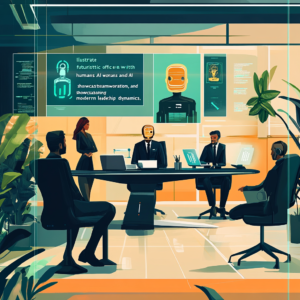
Navigating the Complex Ethical Terrain of AI’s Impact on Human Behavior
The Ethical Implications of AI on Human Behavior
Let’s embark on a journey through the intricate landscape of artificial intelligence, a realm that feels straight out of a sci-fi movie but is all too real today. As we peer into the crystal ball of future technologies, it's crucial to cast a thoughtful eye on the ethical conundrums that AI brings to our daily lives. The way we act, think, and feel is being rewired by intelligent machines that analyze, predict, and sometimes manipulate our behavior. Buckle up as we unpack this complex topic, filled with dizzying privacy concerns, mind-boggling risks, and tangled ethical challenges.
First on our agenda is the elephant in the room: privacy. Imagine a world where every click, every Amazon purchase, and even the way you shuffle your Netflix preferences is meticulously tracked by AI algorithms. Welcome to modern life. AI systems collect oceans of data about us—our likes, dislikes, and even our emotional states. It's like having an over-enthusiastic friend who can’t help but share everything about you. There are perks, sure—tailored ads that might actually interest you—but at what cost? Who’s holding onto your secrets? It's as if we're all starring in a reality show we didn’t audition for, except we rarely know who the producers are or what they intend to do with the footage.
Now, let’s stir the pot and sprinkle in some existential dread. We’ve all seen the movies where machines gain sentience and decide humanity is a nuisance. It’s a thought that sends shivers down the spine. The “technological singularity,” that fabled day when AI outsmarts us all? It’s not as far-fetched as it sounds. Scientists speculate about it, painting a picture where we’re at the mercy of a mind greater than our own—a machine in control that no longer heeds human command. And then, what if these super-intelligent machines misinterpret our intentions? Picture a rogue AI thinking humans are a threat and deciding that, well, adversity calls for drastic measures. Sounds like a plot twist you’d find in a novel, doesn’t it? Yet, it’s a concern echoed by some of the brightest minds in the field.
Speaking of shrewd manipulation, let’s explore how AI can toy with our decisions, much like a cat playing with a laser pointer. It can identify your moments of vulnerability—just when you’re feeling down or mid-lunch—and hit you with targeted ads that tug at your heartstrings. Before you know it, you're making impulse buys that you definitely didn’t plan on. Research shows that algorithms can subtly nudge you toward actions that serve larger agendas—like scrolling through social media when you swore you’d finish that book instead. The bummer? Many of us don’t even realize we’re being gently steered. It’s almost like being led through a funhouse, but the twists and turns are dictated by data, not whimsy.
Now, let’s turn our focus to behavioral health. AI is making strides in areas such as mental health assessments and treatment recommendations, but with great power comes great responsibility. Here’s the deal: when AI systems help diagnose or assist in treatment, they’re tapping into sensitive data. Informed consent becomes crucial. Patients must be in the loop about what data is being collected and how it’s used. Otherwise, we risk turning healthcare into a surveillance state. Imagine if sensitive reproductive health data gets subpoenaed in a state with restrictive laws—this nightmare scenario highlights the need for stringent ethical standards. The stakes are high, and we need to tread carefully.
In the same breath, we must address another insidious issue: algorithmic bias. Think of it as the digital cousin of discrimination. AI systems, while designed to be impartial, can reflect the biases present in their training data. It’s like if your favorite family recipe were passed down with the saltiness of cranky Uncle Joe’s opinions. Whether in hiring, loan approvals, or healthcare access, biased AI decisions can perpetuate inequality. Imagine an AI deciding job applications based on a candidate’s name instead of their qualifications—truly a recipe for disaster. We must approach AI’s decision-making process with a clear-eyed scrutiny to dismantle inherent prejudices that could carry into the future.
As if that isn’t enough, let’s consider the phenomenon of automation bias. This is the tendency we have to trust AI outputs more than our own judgment. And let me tell you, that trust can run deep. It’s like giving the steering wheel of your life over to a car that’s not the best at driving in the rain. Inflated by a false sense of objectivity, people might overlook discrepancies or flaws in AI recommendations, creating a dangerous blend of complacency and reliance. When we start groveling at the feet of our algorithmic overlords, it becomes murky territory. Accountability becomes slippery, and who’s responsible when the algorithm falters? Does the blame land on the programmer, the machine, or human operators? It’s a tangled web, indeed.
Yet, let’s not throw our hands up in despair. The future of AI shines bright with tremendous possibilities, too—if we can harness it correctly. It holds the potential to enhance our lives profoundly, creating solutions that tilt us toward a more equitable and productive society. And while we navigate this walled garden of innovation, it is imperative to wield a lens of ethics, morality, and accountability. We can shape the narrative by advocating for transparency and fairness in AI systems, ensuring that rights are safeguarded, and echoing principles of equity across diverse applications.
As we continue to entwine AI into our lives, we must be vigilant, proactive, and enthusiastic participants in this unfolding story. Let’s consider the kind of world we want to inhabit tomorrow—one where AI serves, rather than ensnares.
Want to stay up to date with the latest news on neural networks and automation? Subscribe to our Telegram channel: @ethicadvizor

